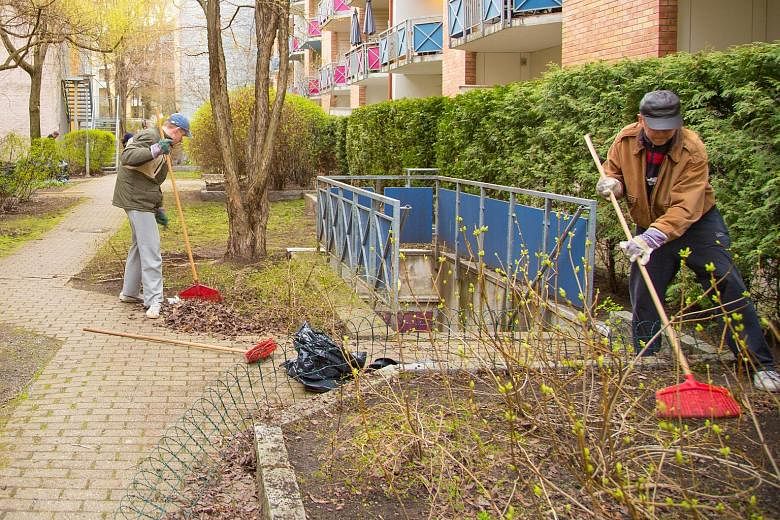It is the day before National Day and people across Norway are working hard to make the whole country clean and tidy ahead of the celebrations on May 17. In a school playground in the small town of Sogndal, lots of parents have turned up to get the area ready.
Six mothers are directing operations. A young father and another parent who is an Eritrean refugee are carrying chairs and tables out. Meanwhile, another group is using birch tree branches and flags to make the space look festive.
This is "dugnad", a word which literally means help or support in Norwegian, a custom of communal work in Norway that dates back centuries, and one that has existed in some form or another in most agricultural societies around the world.
In Norway, dugnad was traditionally a way of getting big tasks like roofing or haymaking done, usually followed by a big meal or a feast. In a nation of farmers and fishermen, it functioned as a kind of community insurance scheme. People helped others out and, as a result, knew that they could always call on the community in their time of need.
Today, dugnad has come to mean unpaid voluntary work done in a group, for local, national or international causes. It has become so entrenched that in 2004, "dugnad" was voted Norway's word of the year. In urban areas, dugnad is generally associated with outdoor spring cleaning and gardening in housing cooperatives. In rural areas, neighbours also sometimes help fix up one another's houses or garages.
This doesn't have to be small scale. Norway may have only around 5.3 million inhabitants but Norwegians take great pride in setting world records - and harnessing the spirit of dugnad has been integral to both the world's largest youth football tournament and the world's largest charity telethon.
Participants of the football tournament say that it is impossible to tell which job or income bracket the volunteers involved come from. Whether a bus driver or a chief executive, for almost a week everyone dresses the same, carries bags for his team, cheers the kids on and sleeps on mattresses on school floors.
The national telethon also relies on the dugnad spirit. Every year, on a Sunday in October, 100,000 Norwegians knock on 2.3 million doors to shake a bucket for a charitable cause. "Dugnad makes you feel like a good person, and it makes the world a better place," Ms Vibecke Ostby, head of the telethon, said. "Of course the amount of money collected is important, but the most important things is to get Norwegians engaged, working together for a cause bigger than themselves."
Informal and flat structures have long characterised Norwegian working life which some attribute to the legacy of years of dugnad: an intentional lack of hierarchy which can leave foreigners struggling to work out who is an ordinary employee and who is a boss at a Norwegian firm.
Surveys show that the number of volunteers in Norway and the amount of time they spend volunteering are high and increasing in some areas. A total of 61 per cent volunteered for at least one organisation in 2014, figures from Statistics Norway show.
Dugnad is also a significant economic contributor. The value of voluntary work in Norway's non-governmental organisations sector, for example, is estimated at just under £6.5 billion (S$11.6 billion) - more than the £4.8 billion of paid work in the sector - around 5 per cent of gross domestic product for mainland Norway in 2014.
Research professor Karl Henrik Sivesind, of the Institute for Social Research in Oslo, has studied dugnad for almost two decades. He said higher earners and the better educated are generally more involved.
"It is a paradox that people not active in the labour market, who would have the most to gain by joining dugnad, contribute the least," he said.
Dugnad is also a good opportunity for new people such as refugees, immigrants and the unemployed to make connections in the community. Doing so can even help develop new skills or connections useful for the job market.
"I remember the first time I was asked to contribute. I didn't know what dugnad really was, but I answered yes right away; I was so happy to be asked," said Ms Yvonne Nshimirimana, a mother of two from Burundi who came to Norway as a refugee 11 years ago.
Dr Sivesind said most people want to take part - and for those who don't, life in small communities in particular can be a little uncomfortable. "If you don't attend, you know you will meet the same people at the stores, at school, at work or other activities," he said.
• This article was originally published in BBC Capital at http://www.bbc.com/capital/story/20180521-how-dugnad-shaped-a-nations-w…

